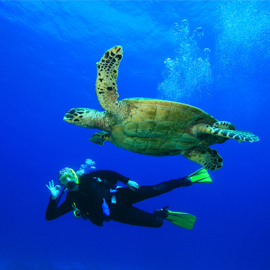Dive Responsibly
Posted: Mar 13 in Dive Blog tagged Diving Safety by Jan
How to keep your dive trips from harming underwater life
Many people pursue their scuba certification in Illinois to get a closer look at the residents of the underwater world. Even if you’ve never taken a scuba class in fish identification, interacting with underwater life is something we all do while diving, whether we mean to or not.
Because preserving aquatic environments should be a goal for every diver, it’s important to always keep your contact with underwater life responsible. Sometimes our actions can terrorize, injure or even kill aquatic life, regardless of whether this outcome is intentional. No matter where you’re diving or why, you should always be aware of how your activities affect the organisms and ecosystem around you.
To maintain the lowest possible impact, it helps to follow one simple rule: look, don’t touch. Observing aquatic life is richly rewarding, and though you may feel compelled to reach out and feel a living creature, this is often terrifying for that creature (sometimes to the point of death). Touching can also be dangerous for the diver, so it’s best to leave the handling of underwater creatures to those who are experienced in doing so. Remember that you can always collect a souvenir of your encounter by bringing your camera along.
It’s best to leave aquatic creatures to their natural devices. This means following a few key practices:
- Do not attempt to ride sea turtles, manta rays, manatees or any other underwater creatures.
- Do not spearfish or gather aquatic life without being completely aware of local laws, which work to maintain a healthy underwater environment and the survival of each species.
- Do not overfeed any underwater creature, or attempt to feed one aquatic organism to another. Even when feeding responsibly, you should only use food you bring with you.
For the most part, scuba divers do little damage to the underwater environment, especially when compared to bigger problems like pollution and offshore dumping. Still, accidents do happen, and doing your best to preserve aquatic habitats will help you set a good example for others. To ensure that your dives don’t cause damage, it will help to take preventative measures like:
- Securing your dive equipment. When accessories, pressure gauges and other pieces of dive gear drag along reefs and the ocean floor, they can cause serious damage. If you make sure your dive equipment always remains close to your body, you’ll both minimize your impact and save energy by reducing drag.
- Diving with caution. Using proper diving techniques will keep your movements from harming aquatic life. Keep yourself neutrally buoyant and correctly weighted, swimming in a horizontal position that leaves little risk of kicking underwater organisms with your fins. Remember that even the slightest bump can harm delicate bottom-dwelling organisms. Glide cautiously and quietly through the water—this will keep your presence from disturbing aquatic creatures, which will help you observe their natural behavior better.
Interacting with aquatic life is one of the biggest perks of getting your scuba certification, so do your best to follow practices that preserve the thrills of the underwater environment for every other diver. How else do you minimize your impact while diving? Tell us in the comments below.
